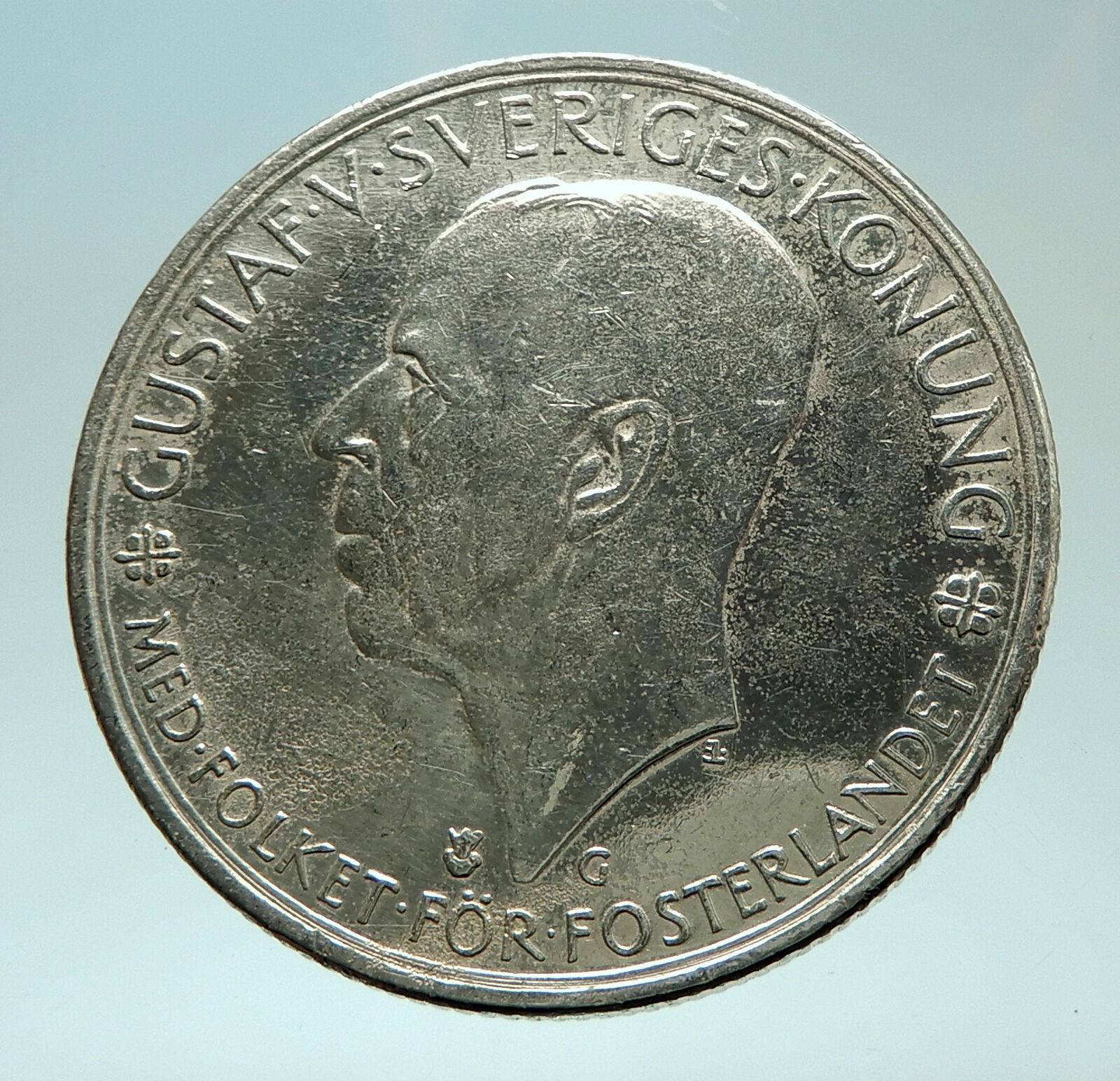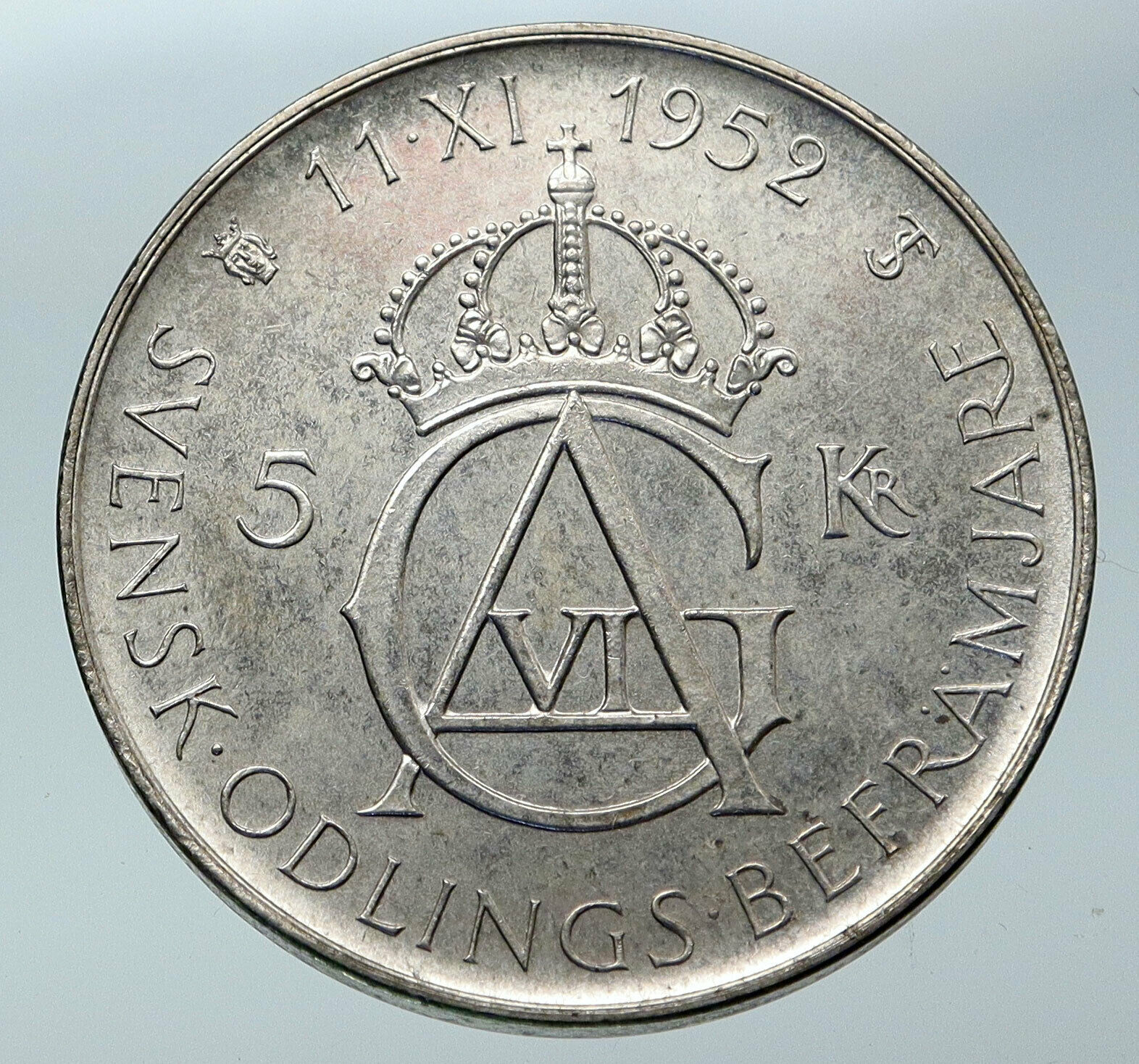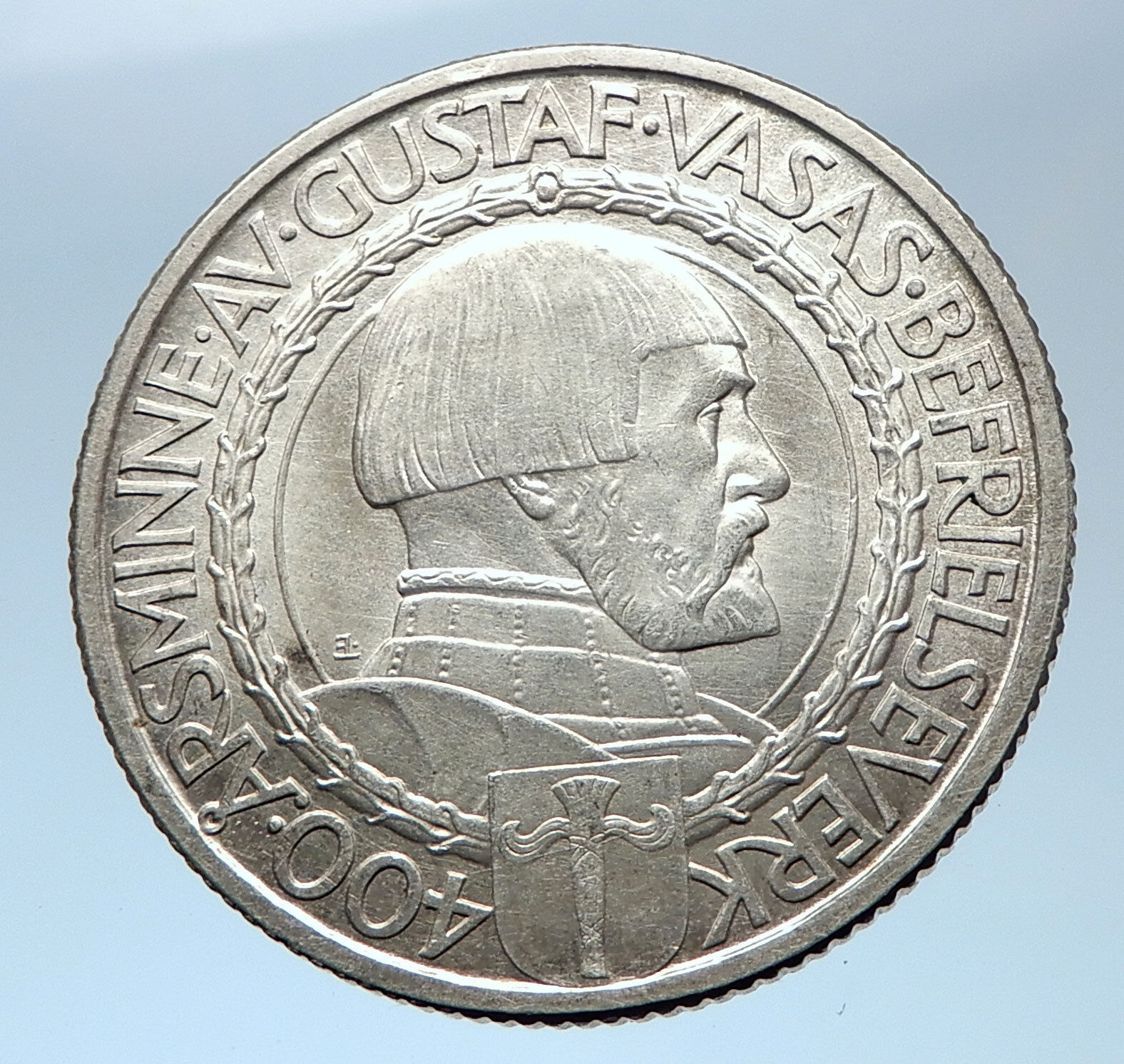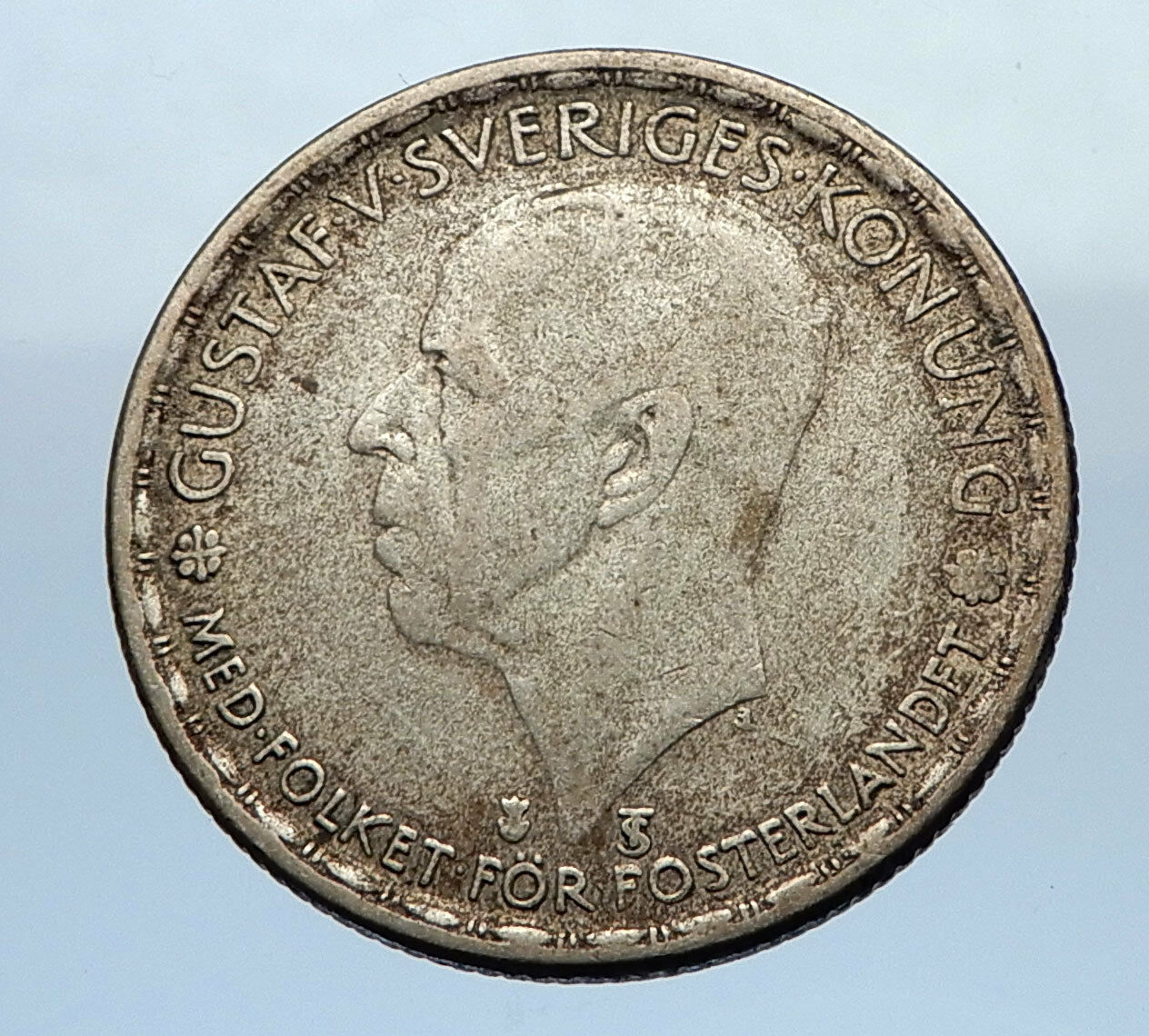|
Sweden under Oscar I – King: 8 March 1844 – 8 July 1859
1851 AG Bronze 1 Riksdaler Specie 39mm (33.74 grams) .750 Silver (0.8198 oz. ASW)
Reference: KM# 667 (1845-55), Dav ECT# 354
OSCAR SVERIGES NORR.GÖTH.OCH VEND.KONUNG., Head of King Oscar I facing right. Legend around rim.
RÄTT OCH SANNING 1R 1852 SP A. G., Crowned bigger Arms of Sweden held by lion supporters at sides, cartouche below.
You are bidding on the exact item pictured, provided with a Certificate of Authenticity and Lifetime Guarantee of Authenticity.
 Oscar I (born Joseph François Oscar Bernadotte; 4 July 1799 – 8 July 1859) was King of Sweden and Norway from 8 March 1844 until his death. He was the second monarch of the House of Bernadotte. Oscar I (born Joseph François Oscar Bernadotte; 4 July 1799 – 8 July 1859) was King of Sweden and Norway from 8 March 1844 until his death. He was the second monarch of the House of Bernadotte.
The only child of King Charles XIV John, Oscar inherited the thrones upon the death of his father. Throughout his reign he would pursue a liberal course in politics in contrast to Charles XIV John, instituting reforms and improving ties between Sweden and Norway. In an address to him in 1857, the Riksdag declared that he had promoted the material prosperity of the kingdom more than any of his predecessors.
In 1824 and 1833, Oscar briefly served as Viceroy of Norway.
 In 1838 Charles XIV John began to suspect that his son was plotting with the Liberal politicians to bring about a change of ministry, or even his own abdication. If Oscar did not actively assist the Opposition on this occasion, his disapprobation of his father’s despotic behaviour was notorious, though he avoided an actual rupture. Yet his liberalism was of the most cautious and moderate character, as the Opposition—shortly after his accession to the thrones in 1844—discovered to their great chagrin. The new king would not hear of any radical reform of the cumbersome and obsolete 1809 Instrument of Government, which made the king a near-autocrat. However, one of his earliest measures was to establish freedom of the press. He also passed the first law supporting gender equality in Sweden when he in 1845 declared that in the absence of a will specifying otherwise, brothers and sisters should have equal inheritance. Oscar I also formally established equality between his two kingdoms by introducing new flags with the common Union badge of Norway and Sweden, as well as a new coat of arms for the union. In 1838 Charles XIV John began to suspect that his son was plotting with the Liberal politicians to bring about a change of ministry, or even his own abdication. If Oscar did not actively assist the Opposition on this occasion, his disapprobation of his father’s despotic behaviour was notorious, though he avoided an actual rupture. Yet his liberalism was of the most cautious and moderate character, as the Opposition—shortly after his accession to the thrones in 1844—discovered to their great chagrin. The new king would not hear of any radical reform of the cumbersome and obsolete 1809 Instrument of Government, which made the king a near-autocrat. However, one of his earliest measures was to establish freedom of the press. He also passed the first law supporting gender equality in Sweden when he in 1845 declared that in the absence of a will specifying otherwise, brothers and sisters should have equal inheritance. Oscar I also formally established equality between his two kingdoms by introducing new flags with the common Union badge of Norway and Sweden, as well as a new coat of arms for the union.
In foreign affairs, Oscar I was a friend of the principle of nationality; in 1848 he supported Denmark against the Kingdom of Prussia in the First War of Schleswig by placing Swedish and Norwegian troops in cantonments in Funen and North Schleswig (1849–1850), and was the mediator of the Truce of Malmö (26 August 1848). He was also one of the guarantors of the integrity of Denmark (the London Protocol, 8 May 1852).
As early as 1850, Oscar I had conceived the plan of a dynastic union of the three Scandinavian kingdoms, but such difficulties presented themselves that the scheme had to be abandoned. He succeeded, however, in reversing his father’s obsequious policy towards Imperial Russia. His fear lest Russia should demand a stretch of coast along the Varanger Fjord induced him to remain neutral during the Crimean War, and, subsequently, to conclude an alliance with Great Britain and the Second French Empire (25 November 1855) for preserving the territorial integrity of Sweden-Norway.
 Sweden, officially the Kingdom of Sweden, is a Scandinavian country in Northern Europe. It borders Norway and Finland, and is connected to Denmark by a bridge-tunnel across the Öresund. At 450,295 square kilometres (173,860 sq mi), Sweden is the third-largest country in the European Union by area, with a total population of over 9.8 million. Sweden consequently has a low population density of 21 inhabitants per square kilometre (54/sq mi), with the highest concentration in the southern half of the country. Approximately 85% of the population lives in urban areas. Southern Sweden is predominantly agricultural, while the north is heavily forested. Sweden is part of the geographical area of Fennoscandia. Sweden, officially the Kingdom of Sweden, is a Scandinavian country in Northern Europe. It borders Norway and Finland, and is connected to Denmark by a bridge-tunnel across the Öresund. At 450,295 square kilometres (173,860 sq mi), Sweden is the third-largest country in the European Union by area, with a total population of over 9.8 million. Sweden consequently has a low population density of 21 inhabitants per square kilometre (54/sq mi), with the highest concentration in the southern half of the country. Approximately 85% of the population lives in urban areas. Southern Sweden is predominantly agricultural, while the north is heavily forested. Sweden is part of the geographical area of Fennoscandia.
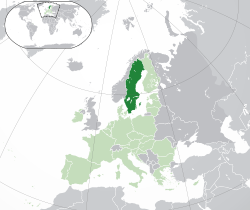
 Germanic peoples have inhabited Sweden since prehistoric times, emerging into history as the Geats/Götar and Swedes/Svear and constituting the sea peoples known as the Norsemen. Sweden emerged as an independent and unified country during the Middle Ages. In the 17th century, it expanded its territories to form the Swedish Empire, which became one of the great powers of Europe until the early 18th century. Swedish territories outside the Scandinavian Peninsula were gradually lost during the 18th and 19th centuries, beginning with the annexation of present-day Finland by Russia in 1809. The last war in which Sweden was directly involved was in 1814, when Norway was militarily forced into personal union. Germanic peoples have inhabited Sweden since prehistoric times, emerging into history as the Geats/Götar and Swedes/Svear and constituting the sea peoples known as the Norsemen. Sweden emerged as an independent and unified country during the Middle Ages. In the 17th century, it expanded its territories to form the Swedish Empire, which became one of the great powers of Europe until the early 18th century. Swedish territories outside the Scandinavian Peninsula were gradually lost during the 18th and 19th centuries, beginning with the annexation of present-day Finland by Russia in 1809. The last war in which Sweden was directly involved was in 1814, when Norway was militarily forced into personal union.
Since then, Sweden has been at peace, maintaining an official policy of neutrality in foreign affairs. The union with Norway was peacefully dissolved in 1905, leading to Sweden’s current borders. Though it was formally neutral through both world wars, Sweden engaged in humanitarian efforts, such as taking in refugees from German-occupied Europe. After the end of the Cold War, Sweden joined the European Union on 1 January 1995, but declined NATO membership.
Today, Sweden is a constitutional monarchy and a parliamentary democracy, with the Monarch as the head of state. The capital city is Stockholm, which is also the most populous city in the country. Legislative power is vested in the 349-member unicameral Riksdag. Executive power is exercised by the Government, chaired by the Prime Minister. Sweden is a unitary state, currently divided into 21 counties and 290 municipalities.
Sweden maintains a Nordic social welfare system that provides universal health care and tertiary education for its citizens. It has the world’s eighth-highest per capita income and ranks highly in numerous metrics of national performance, including quality of life, health, education, protection of civil liberties, economic competitiveness, equality, prosperity and human development. Sweden has been a member of the European Union since 1 January 1995, but declined Eurozone membership following a referendum. It is also a member of the United Nations, the Nordic Council, Council of Europe, the World Trade Organization and the Organisation for Economic Co-operation and Development (OECD).
|




 Oscar I (born Joseph François Oscar Bernadotte; 4 July 1799 – 8 July 1859) was King of Sweden and Norway from 8 March 1844 until his death. He was the second monarch of the House of Bernadotte.
Oscar I (born Joseph François Oscar Bernadotte; 4 July 1799 – 8 July 1859) was King of Sweden and Norway from 8 March 1844 until his death. He was the second monarch of the House of Bernadotte. In 1838 Charles XIV John began to suspect that his son was plotting with the Liberal politicians to bring about a change of ministry, or even his own abdication. If Oscar did not actively assist the Opposition on this occasion, his disapprobation of his father’s despotic behaviour was notorious, though he avoided an actual rupture. Yet his liberalism was of the most cautious and moderate character, as the Opposition—shortly after his accession to the thrones in 1844—discovered to their great chagrin. The new king would not hear of any radical reform of the cumbersome and obsolete 1809 Instrument of Government, which made the king a near-autocrat. However, one of his earliest measures was to establish freedom of the press. He also passed the first law supporting gender equality in Sweden when he in 1845 declared that in the absence of a will specifying otherwise, brothers and sisters should have equal inheritance. Oscar I also formally established equality between his two kingdoms by introducing new flags with the common Union badge of Norway and Sweden, as well as a new coat of arms for the union.
In 1838 Charles XIV John began to suspect that his son was plotting with the Liberal politicians to bring about a change of ministry, or even his own abdication. If Oscar did not actively assist the Opposition on this occasion, his disapprobation of his father’s despotic behaviour was notorious, though he avoided an actual rupture. Yet his liberalism was of the most cautious and moderate character, as the Opposition—shortly after his accession to the thrones in 1844—discovered to their great chagrin. The new king would not hear of any radical reform of the cumbersome and obsolete 1809 Instrument of Government, which made the king a near-autocrat. However, one of his earliest measures was to establish freedom of the press. He also passed the first law supporting gender equality in Sweden when he in 1845 declared that in the absence of a will specifying otherwise, brothers and sisters should have equal inheritance. Oscar I also formally established equality between his two kingdoms by introducing new flags with the common Union badge of Norway and Sweden, as well as a new coat of arms for the union. Sweden, officially the Kingdom of Sweden, is a Scandinavian country in Northern Europe. It borders Norway and Finland, and is connected to Denmark by a bridge-tunnel across the Öresund. At 450,295 square kilometres (173,860 sq mi), Sweden is the third-largest country in the European Union by area, with a total population of over 9.8 million. Sweden consequently has a low population density of 21 inhabitants per square kilometre (54/sq mi), with the highest concentration in the southern half of the country. Approximately 85% of the population lives in urban areas. Southern Sweden is predominantly agricultural, while the north is heavily forested. Sweden is part of the geographical area of Fennoscandia.
Sweden, officially the Kingdom of Sweden, is a Scandinavian country in Northern Europe. It borders Norway and Finland, and is connected to Denmark by a bridge-tunnel across the Öresund. At 450,295 square kilometres (173,860 sq mi), Sweden is the third-largest country in the European Union by area, with a total population of over 9.8 million. Sweden consequently has a low population density of 21 inhabitants per square kilometre (54/sq mi), with the highest concentration in the southern half of the country. Approximately 85% of the population lives in urban areas. Southern Sweden is predominantly agricultural, while the north is heavily forested. Sweden is part of the geographical area of Fennoscandia.
 Germanic peoples have inhabited Sweden since prehistoric times, emerging into history as the Geats/Götar and Swedes/Svear and constituting the sea peoples known as the Norsemen. Sweden emerged as an independent and unified country during the Middle Ages. In the 17th century, it expanded its territories to form the Swedish Empire, which became one of the great powers of Europe until the early 18th century. Swedish territories outside the Scandinavian Peninsula were gradually lost during the 18th and 19th centuries, beginning with the annexation of present-day Finland by Russia in 1809. The last war in which Sweden was directly involved was in 1814, when Norway was militarily forced into personal union.
Germanic peoples have inhabited Sweden since prehistoric times, emerging into history as the Geats/Götar and Swedes/Svear and constituting the sea peoples known as the Norsemen. Sweden emerged as an independent and unified country during the Middle Ages. In the 17th century, it expanded its territories to form the Swedish Empire, which became one of the great powers of Europe until the early 18th century. Swedish territories outside the Scandinavian Peninsula were gradually lost during the 18th and 19th centuries, beginning with the annexation of present-day Finland by Russia in 1809. The last war in which Sweden was directly involved was in 1814, when Norway was militarily forced into personal union.

